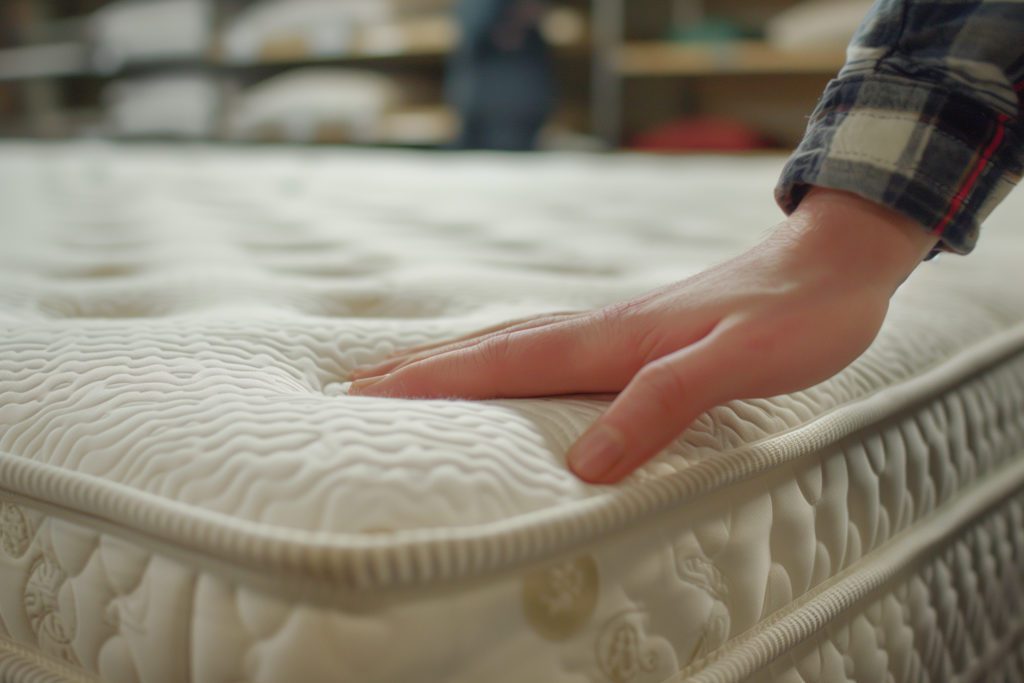
4-7-8 Breathing Technique: A Proven Method for Falling Asleep Faster
Discover the 4-7-8 breathwork technique for better sleep and more restful nights. Explore its benefits, the research, and how you can use it, too.

Chances are, you've likely had trouble falling asleep one night or possibly even many more. You've probably tried every method known to man to find a way to fall asleep faster. What if we told you that there was a breathwork technique that you could use to fall asleep faster and relax?
In this article, we'll discuss the 4-7-8 breathing technique and why it is so impactful for those who want to fall asleep faster. We'll even explore how it helps with sleep and how you can use it yourself if you find yourself having trouble winding down after a long day. First, let's explore what this technique is.
What is the 4-7-8 Breathing Technique?
The 4-7-8 breathing technique is based on pranayama, an ancient yogic method that helps with relaxation, sleep, and stress relief. The general premise is that you would inhale for four seconds, hold your breath without straining for seven seconds, and then exhale slowly for eight seconds. Each inhalation would be in through your nose, and each exhalation would be out through your mouth. It's a simple but effective way to bring your body into a state of deep relaxation and to bring yourself into the present moment.
Many people love this technique because it is designed to bring your body back into balance when you're stressed. People use it when they're having a bad day, if they're looking to truly rest and recover, or even if they're looking to meditate for a brief moment. Best of all, you can also use it to sleep, making it truly effective and a multi-functional breathwork technique that can drastically impact your overall quality of life.
How the 4-7-8 Breathing Technique Helps with Sleep
Reduction in Anxiety and Depression
The first way that this breathing technique helps with sleep is by lessening the amount of anxiety and depressive symptoms that you may experience in your daily life. Numerous studies have shown this, but one of the most important in the last few years showed that the 4-7-8 method helped alleviate anxiety in patients who have just undergone bariatric surgery (Source: Springer Link). Even though this was not applied to the general population, it's clear that this technique alleviates anxiety, especially for people facing significant circumstances.
Other health care providers have also used this breathwork technique in their own practice, seeing significant improvements in their patients that help to alleviate stress, as well as anxiety and depression, and even improve their sleep. What this demonstrates is not only that this breathwork technique works but that it genuinely does alleviate several mental health symptoms while also contributing to a better quality of sleep over time. Yet, this is not the only benefit that is of mention.
Improved Overall Health
The 4-7-8 breath work technique also has been demonstrated to significantly help with improving overall health, not just mental health. While relieving stress, anxiety, and depressive symptoms is a significant bonus for many, one's overall health is ultimately improved as well from the use of this breathwork technique.
One study conducted on healthy young adults between the ages of 18 and 25 demonstrated that the use of this technique led to better cardiac and nervous system function, as well as better blood pressure and blood glucose levels. All of this demonstrates an overall impact on one's health and an improvement, as well as key indicators that show how healthy someone truly is.
Not only do you feel more relaxed when you use the 4-7-8 breathwork technique, but you also see a significant improvement in your overall health. This is also related to improvements in pain felt by many patients and even a lessening of overall chronic pain.
Lessening of Chronic Pain
One of the main reasons that people may find this breathwork technique to be most effective for their sleep is because it can actually reduce the amount of pain for individuals who have just undergone surgeries, such as laparoscopic bariatric surgery. A similar study that we have also discussed demonstrated that this breathing exercise significantly affected the patient's pain level and also reduced it, allowing them to improve their sleep quality and get enough rest after their surgery (Source: Bariatric Surgical Practice and Patient Care).
While this study was done on patients who had just undergone a significant surgery, simply imagine what this could be like for ordinary patients who may not have the same health conditions or surgery history. The fact that this breathwork technique can actually eliminate a degree of chronic pain is a huge benefit and one that undoubtedly is a major contributing factor to why people feel they get better sleep when they use this breathwork technique.
Now, let's look at how you can use this in your own life to experience the benefits of the 4-7-8 breathwork technique.
How to Use the 4-7-8 Breathing Technique
If you want to use the breathwork technique yourself, the first step you'll take if you're about to go to sleep is to lie down. Get comfortable and position your tongue on the roof of your mouth, with your tongue touching your teeth. First, breathe out deeply through your mouth, letting all of the air leave your lungs. Then, inhale for a count of four through your nose, but don't go too fast.
After you inhale, hold your breath for seven seconds. Do not strain or hurt yourself when you're holding your breath, but do so in a relaxed manner enough to truly feel the way that your body reacts to this. Then, breathe out through your mouth and make a whooshing sound when you let go, counting to eight until all the air has left your lungs again. Repeat this for at least three cycles to truly see the benefits of this.
Be mindful that if you are first starting this breathwork exercise, you will probably feel a little short of breath and may feel as though it's a bit more of a workout than you anticipated. This is totally normal, so be sure to take it slow, breathing deeply and slowly. Over time, you'll notice that your breath becomes even slower and easier, and soon, this breathwork will become a regular part of your routine before going to sleep.
Practice Breathwork Before Bed for Optimal Sleep
With such a powerful technique, you'll be able to get optimal sleep in no time. We hope you learned more about how to get more restful sleep for all of your activities in the days ahead. To learn more about sleep efficiency and how to improve your quality of sleep over time, visit Pillow today.
FAQ
Can this technique help if I wake up in the middle of the night?
Absolutely! If you wake up and struggle to fall back asleep, try a few rounds of 4-7-8 breathing to relax your body and quiet your mind.
What’s the best position for 4-7-8 breathing?
Lying down is ideal for sleep, but you can also use this technique while sitting at your desk, in bed, or even during stressful moments throughout the day.
Does 4-7-8 breathing work for power naps too?
Yes! If you need a quick midday nap, this technique can help you fall asleep faster and get the most out of a short rest.
Can kids use the 4-7-8 breathing technique for sleep?
Try combining it with progressive muscle relaxation (tensing and relaxing muscles) or visualizing a peaceful scene to keep your mind from wandering.
What should I do if my mind still races while doing 4-7-8 breathing?
Try combining it with progressive muscle relaxation (tensing and relaxing muscles) or visualizing a peaceful scene to keep your mind from wandering.
Can I do 4-7-8 breathing while lying on my side?
Yes! While lying on your back is recommended, you can do it in any comfortable position, including on your side or slightly propped up if that feels better.

Written by
Marie Soukup
Marie Soukup is a seasoned copywriter, editor, and Integrative Nutrition Health Coach with a certificate from the Institute of Integrative Nutrition (IIN). With years of experience working with brands across diverse industries, Marie is passionate about holistic health and crafting compelling content.
Download Pillow
Get help
Press & News
Legal
Connect
X (Twitter)
Company
Copyright © Neybox Digital Ltd.



